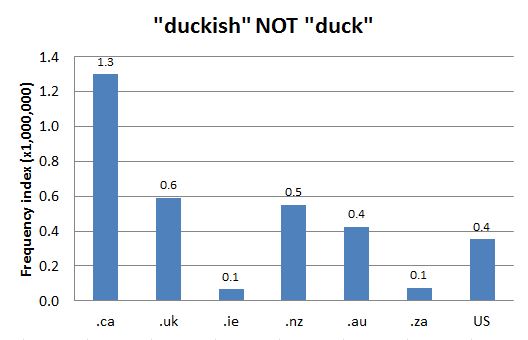DCHP-2
duckish duckies, duckest DCHP-2 (July 2016)
exp. — Newfoundland, somewhat rare
dusk or twilight.
Type: 2. Preservation — Duckish is one of many lexical preservations from West Country English, brought to Newfoundland with the large number of immigrants to Newfoundland from southwest England (Clarke 2010b: 106). The term derives from duck, a variation of 'dusk' originally used in Devon, Dorset and the Isle of Wight as well as Newfoundland (EDD, s.v. "duck" (sb.4)). The spelling variant duckies is marked "Nfld." in EDD, which was published between 1898 and 1905, thus making the Newfoundland character of the term(s) a long-known fact. The variant duckish is most common in Canada. All hits in Chart 1 relate to Newfoundland. It is often used in combination with the progressive form of come and the get-passive construction to express the shift from day to night (see, for example, the 1992 and 2012 quotations).
See also COD-2, s.v. "duckish", which is marked "Cdn (Nfld)", ITP Nelson, s.v. "duckish", which is marked "Newfoundland.", DNE, s.v. "duckish", and EDD, s.v. "duck" (sb.4), which is marked "I.W. Dor. Dev. Nfld." [Isle of Wight, Dorset, Devon, Newfoundland].References:
Images:
Chart 1: Internet Domain Search, 27 May 2014
